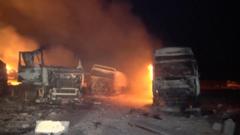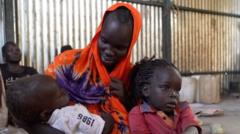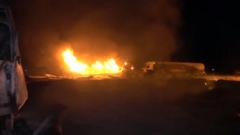The US military conducted airstrikes on the Ras Isa oil terminal in Yemen, reportedly killing at least 74 individuals, predominantly civilians. The attack aimed at crippling Houthi operations, but has drawn accusations of war crimes from the Houthi administration, highlighting the ongoing humanitarian crisis in the region amidst escalating tensions.
US Airstrikes on Yemen’s Ras Isa Terminal Result in Casualties and Tensions

US Airstrikes on Yemen’s Ras Isa Terminal Result in Casualties and Tensions
A recent series of US airstrikes on a Yemeni oil terminal controlled by the Houthi movement has led to significant loss of life and raised concerns of further escalations in the region.
US airstrikes targeting a key oil terminal in Yemen's Red Sea region have claimed the lives of at least 74 individuals, according to reports from the Houthi-controlled health ministry. The military action, described by US officials as a measure to disrupt fuel supplies and funding to the Iran-backed Houthi movement, has sparked significant backlash from the Houthi-led government, which asserts that the terminal was a civilian facility and the attacks represent a "war crime."
Witnesses and local media reported that 14 airstrikes hit the Ras Isa terminal late Thursday. Footage shared by Houthi-run Al-Masirah TV displayed the devastation, showing extensive explosions, large fires, and burnt fuel tankers. Eyewitness accounts described chaotic scenarios as employees fled amidst ongoing strikes, transforming the area into a scene of destruction.
After the strikes, Houthi health ministry spokesman Anees al-Asbahi confirmed a growing casualty number, indicating that rescue efforts were underway to find victims buried in the rubble. Reports also emerged of paramedics being targeted in subsequent strikes while trying to assist the injured. The Houthi-led government sharply criticized the US action, calling the targeting of the Ras Isa oil port a blatant war crime and held the US administration accountable for the escalating situation.
In a retaliatory response, thousands of Houthi supporters rallied in the capital city of Sanaa, denouncing US military actions. The US Central Command defended the airstrikes, asserting their intent to diminish the Houthis' economic capabilities amid ongoing conflict that has ravaged Yemen for nearly a decade, resulting in catastrophic humanitarian consequences affecting millions.
As regional tensions rise, Iran condemned the airstrikes, labeling them as "barbaric." Houthi leadership maintained their resilience, asserting their capability to carry out attacks despite the US military's efforts. The Houthi movement continues to justify its military operations as part of a broader support for Palestinians amidst the ongoing Israel-Hamas conflict.
The civil war in Yemen, which escalated after the Houthis seized control of the north-west region, has resulted in over 150,000 fatalities and displaced millions, exacerbating one of the world's worst humanitarian crises. With the Houthis persistently targeting vessels in the Red Sea, and the recent renewal of US military engagement under the Trump administration, the situation remains tense and complex.




















